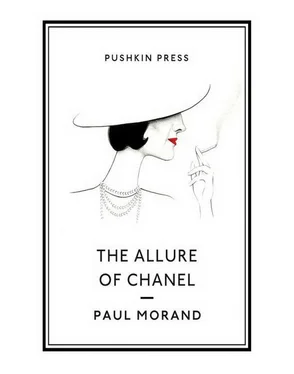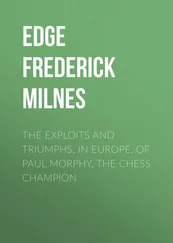Do you see what a foul temper I really have?
I admire and love America. It’s where I made my fortune. For many Americans (whom we don’t know, and neither do I), I am France. I think I would be better understood there than anywhere else, because America does not work ‘for Americans’; that is to say, like our French couturiers do, with their gazes fixed on Life and Fortune . Present-day America is overpopulated with French people, with writers, professors, politicians and journalists. Have American fashions been influenced in the slightest way? There is luxury in America, but the spirit of luxury still resides in France. I know what luxury is. For ten years I lived in the world’s greatest luxury. Why go and look for American or English models, as Molyneux does? Why go to New York to look for a style that is brought back to Paris and transformed? A dress is not like those Bordeaux wines that travelled round the world and which would improve during their crossing by sailing ship.
People in the trade are not meant to think about eccentricity, but quite the reverse, to remedy whatever there may be that is excessive. I prefer what is too respectable. You have to use what is at your disposal; a woman who is too beautiful upsets others, and one who is too ugly depresses the strong sex.
There are five intelligent women in a million: who can say this to them, if not a woman?
Women think of every colour, except the absence of colours. I have said that black had everything. White too. They have an absolute beauty. It is perfect harmony. Dress women in white or black at a ball: they are the only ones you see.
Customers are solely interested in detail; they can’t concentrate. They are wrong to disregard men’s opinions. For men love to go out with well-dressed women, but not when they are conspicuous. If their partner looks conspicuous, they prefer to stay at home, to avoid the agony of being stared at. Why are women not content simply to please, but have to surprise? Only very young men need to have their happiness spelled out to them, for the crowd to turn round as their partner passes by.
Revolutions in fashion should be conscious ones, the changes gradual and imperceptible. I have never started off with a preconception, with an abstract idea; I have never decided ten months beforehand that dresses would be worn longer the following season.
I have never had actresses as customers. As far as fashion is concerned, actresses no longer existed after 1914. Before that, they dictated the fashion.
ONE DAY, PAMELA, the Englishwoman who worked for me, came and said to me (we were in the South of France):
“Do me a favour. It won’t cost you anything. If you do it for me, I shall be given a present. I want a present or, more precisely, I need one. Westminster has just arrived. His yacht is lying at anchor off Monaco. He wants to meet you. I have promised, in exchange for a reward, to take you to dine there.”
I liked this all too unusual plain-speaking, but it didn’t disarm me. I was accustomed to Pamela, accustomed to seeing women purely as monsters.
“I certainly won’t go.”
I beg you!’
“I won’t go.”
Soon afterwards, with my usual spinelessness, I had relented. Pamela would have her present. I agreed to have dinner the following evening. During the daytime a telegram arrived from Paris, sent by Dimitri, informing me that he would actually be arriving next day. I cancelled my appointment, naturally. When Dimitri turned up, I told him about this, in front of Pamela.
“Had I been invited, I would very much have enjoyed seeing this yacht,” said Dimitri in a delightfully casual way.
“That’s fine, I’ll arrange for you to be invited,” said Pamela, immediately spotting a solution.
Two hours later, Westminster invited the grand-duke to dinner that same evening.
“Dimitri, you were wrong …” I said.
“Why?”
“I don’t know. But one shouldn’t force fate. Somehow I feel that you might have done better to have dinner alone with me …”
Ten years of my life have been spent with Westminster. I will describe later on what those years were like. First, I’m going to describe the man, because the greatest pleasure he gave me was to watch him live. Beneath his clumsy exterior, he’s a skilful hunter. You’d have to be skilful to hang on to me for ten years. These ten years were spent living very lovingly and very amicably with him. We have remained friends. I loved him, or I thought that I loved him, which amounts to the same thing. He is courtesy itself, kindness personified. He still belongs to a generation of well-brought-up men. All Englishmen, for that matter, are well brought up, until they reach Calais at least.
Shortly before the war, I was invited to dinner at the house of M Jean Prouvost, the editor of an important evening newspaper. Being very punctual, I arrived at his home at 8.45 pm, the appointed time. On the pretext of a headache, M Prouvost had his guests wait for two hours. We had to wait to sit ourselves down at table. M Prouvost didn’t even apologise. The lessons in good behaviour that he was being given at the time by a little high society lady had been of no use to him at all.
To behave badly in an elegant way, you first have to have been well brought up. This was the case with Westminster.
He is simplicity made man, the shyest person I’ve ever met. He has the shyness of kings, of people who are isolated through their circumstances and through their wealth. Because he is thought to be among the most important men in England, he is embarrassed by this; he knows people know; he would be no less embarrassed if he wanted to prove that he is a man like all the others. Westminster hates meeting people, and he avoids first encounters. Unless he manages to bypass the obstacle and get past unwittingly, with his head down, in which case, once the danger has been overcome, he looks a happy man. I caught sight of him one day in Biarritz, coming out of a bar, holding, in a familiar way, the arm of a man who was talking to him garrulously and with gay abandon.
“Do you know who he is?” I asked Westminster when he had rejoined me.
“Not at all.”
“He’s Poiret, the couturier.”
“A good fellow!” said Westminster, delighted.
The following day he came across Poiret at the tennis club, greeted him in the most friendly manner, and came over towards me, gloating.
“You know,” he said, “your Poiret didn’t intimidate me in the least.”
I mention this characteristic, because it is like those you come across in memoirs; it could belong to Louis XVI, Charles VI, or a child king.
Westminster is elegance itself: he never has anything new; I was obliged to go and buy him some shoes, and he’s been wearing the same jackets for twenty-five years. Nothing would make him go to the tailor, or receive a visit from him. Westminster owns two yachts: a Royal Navy reserve destroyer and a four-master. When you arrive on dry land, all the guests are wearing splendid yachting caps to go and buy postcards in the port. He never disembarks except in an old soft hat.
Westminster is the richest man in England, perhaps in Europe. (Nobody knows this, not even him, especially not him.) I mention this firstly because at such a level wealth is no longer vulgar, it is located well beyond envy and it assumes catastrophic proportions; but I mention it above all because it makes Westminster the last offspring of a vanished civilisation, a palaeontological curiosity who naturally finds a place in these memories. Showing me over the luxurious surroundings of Eaton Hall, one of Westminster’s residences, Lord Lonsdale said to me:
“Once the owner is no more, what we are seeing here will be finished.”
Читать дальше












